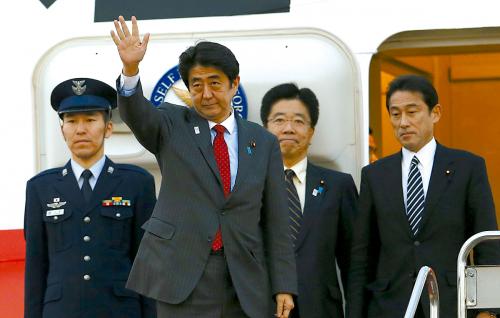Washington should not be hijacked by Japan
 0 Comment(s)
0 Comment(s) Print
Print E-mail Xinhua, February 22, 2013
E-mail Xinhua, February 22, 2013
 |
|
Japanese Prime Minister Shinzo Abe leaves Tokyo for Washington D.C. on Feb. 21, 2013. |
Japanese Prime Minister Shinzo Abe, whose government has been engaged in a bitter dispute with neighboring China over the Diaoyu Islands, will meet with U.S. President Barack Obama in Washington on Friday.
The Japanese leader is desperate to use the summit to secure U.S. support for Japan in the territorial row, but Washington has every reason to be cautious on the issue.
First of all, Japan is fully responsible for creating the devastating dispute with China in the first place by adopting the reckless policy of "purchasing" the Diaoyu Islands, an integral part of the Chinese territories, and for the subsequent deteriorating China-Japan relations.P U.S. support for Japan on the issue would not only damage Washington's credibility as a constructive superpower, but also as an important partner of China on many pressing global issues.
It would also send a wrong signal to hawkish Japanese politicians and encourage them to take further provocative actions, which will definitely send China-Japan relations to new lows and even threaten the peace and stability in East Asia.
From a strategic perspective, U.S. leaders will find Washington and Beijing actually have so much in common in safeguarding the peace and promoting prosperity in the Asia-Pacific that a right-leaning Japan turns out to be the real trouble-maker.
The U.S. and China, as the world's No.1 and No.2 economies, have joined hands in staving the worst effects of the global financial crisis and ensuring strong and sustainable global economic recovery.
The two major powers, despite so many apparent differences, have also managed to build a constructive relationship on resolving pressing global issues, from fight against international terrorism to efforts to maintain peace on the Korean Peninsula.
On the other hand, Japan has been engaged in unwise territorial quarrels not only with China, but also with South Korea and Russia, posing a significant risk to regional stability.
What is even worse is that Japan's right-wing politicians and theorists, whose ideological forebears had caused great harm both to the United States and China in World War II, have long been seeking to shed U.S. check and never shied away from their declared intention to become a so-called "normal" country.
Washington, instead of being hijacked by Tokyo in its territorial dispute with China, should work together with Beijing to rein in the dangerous ambitions of rightist Japanese politicians and maintain the precious peace and stability in the region.
After all, it is the United States and China, as the two largest economies in the world, that will benefit most from a peaceful and stable Asia-Pacific.






Go to Forum >>0 Comment(s)